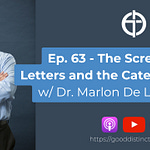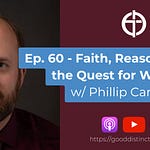I was thrilled to interview a friend of mine, Nicole Delaney, about her work at the Tribunal and Office of Canonical Services for the Diocese of Phoenix and the role of Canon Law more generally. It was a great conversation.
Just a note: in an effort to continue producing high quality content, consistently, I am switching to an audio-only format, for the most part. I might record the occasional video, but editing is very time-intensive for video and, since I have a full-time job, it is far more difficult to find time to record video rather than just audio. So, Good Distinctions presses on, with a slightly different format.
Also, I have paused paid subscriptions, as I have restructured from an LLC to a Sole Proprietorship. What does that mean? Not much for you, dear listeners. But if you want to contribute to the show in some way or help me pay for the recording software, please email me at gooddistinctions@gmail.com.
In this conversation, Will Wright interviews Nicole Delaney, JCL, a Canon lawyer for the Diocese of Phoenix. They discuss the importance and purpose of canon law in the Catholic Church. Nicole explains that canon law is the practical application of faith and helps organize and protect the rights and sacraments of the Church. They also touch on the interplay between canon law and civil law, with Nicole highlighting the differences between Roman law and common law systems. Nicole shares the various responsibilities of the Tribunal and the Office of Canonical Services, including handling annulments, religious law, Eastern Catholics, and penal cases. They discuss the training of priests in canon law and the importance of priests having a basic understanding of canon law to carry out their pastoral duties effectively.
In this conversation, Nicole Delaney, JCL, emphasizes the importance of understanding canon law and its relationship to theology. She encourages individuals, especially priests and deacons, to study canon law to gain a deeper understanding of the why behind the law. Delaney also discusses the distinction between sin and crime in canon law, highlighting that not all sins are crimes and vice versa. She explains the process of prosecuting crimes in the Church and the role of the promoter of justice. Delaney clarifies the difference between excommunication and not being able to receive communion, emphasizing that excommunication is a penalty for a crime, while not being able to receive communion is a pastoral decision made by the minister of communion. She also addresses the issue of manifest grave sin and the responsibility of the minister of communion to deny the sacrament in such cases.
Takeaways
Canon law is the practical application of faith in the Catholic Church, helping to organize and protect the rights and sacraments of the Church.
Canon law is based on Roman law and differs from common law systems.
The Tribunal and the Office of Canonical Services handle various responsibilities, including annulments, religious law, Eastern Catholics, and penal cases.
Priests should have a basic understanding of canon law to effectively carry out their pastoral duties.
The commentary on canon law is a helpful resource for pastoral ministers facing specific situations in their parishes. Studying canon law helps individuals understand the why behind the law and how to apply it in daily life.
Not all sins are crimes in canon law, and not all crimes are sins.
The process of prosecuting crimes in the Church involves a preliminary investigation, interviews, and decisions made by different courts depending on the severity of the crime.
Excommunication is a penalty for a crime, while not being able to receive communion is a pastoral decision made by the minister of communion.
The distinction between sin and crime is important in understanding the Church's approach to discipline and the salvation of souls.
Keywords
canon law, Catholic Church, faith, organization, rights, sacraments, civil law, Roman law, common law, Tribunal, Office of Canonical Services, annulments, religious law, Eastern Catholics, penal cases, training, priests, pastoral duties, canon law, theology, sin, crime, prosecution, excommunication, communion, manifest grave sin










